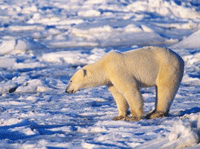
Earlier this month, the outgoing chair of the Senate Committee on the Environment and Public Works, Senator James Inhofe (R-Okla), published “A Skeptic’s Guide to Dubunking Global Warming Alarmism,” in which he lambasted the media’s depiction of imperiled polar bears as nothing more than “unfounded hype.” Inhofe, who after reading one newspaper article presumes that polar bears are as happy and healthy as they appear in Coke commercials, will likely be displeased by the Department of the Interior’s proposal to list polar bears as a “threatened species” under the Endangered Species Act. Today’s announcement comes a year after conservation groups sued the Bush administration for ignoring petitions demanding protection for the bear.
“We are concerned the polar bears’ habitat may virtually be melting.” Interior Secretary Dirk Kempthorne said, commenting on the most recent analysis done by the Fish and Wildlife Service. According to the FWS, summer arctic ice cover, which polar bears depend on for reaching their prey, has diminished steadily over the past 30 years. No final decision, however, will be made on whether to list the polar bear for at least a year as the Department of the Interior allows time for further study and public comment. Nonetheless, today’s proposal marks the first time that the Bush administration has acknowledged climate change’s responsibility for a species’ potential extinction.
Even if polar bears catch a break and are granted “threatened status,” don’t count on huge practical implications given the administration’s history of obstructing any government action aimed at addressing climate change. For example, the administration squashed state-led efforts to limit car emissions, arguing that the Clean Air Act does not grant it the authority to regulate greenhouse gases (a decision currently under review by the Supreme Court). If pressed, the administration will likely argue that the Endangered Species Act is similarly deficient as a basis for capping carbon. Yet, at the very least, listing the polar bear would obligate the Fish and Wildlife Service to develop a recovery plan. Whether such a strategy will involve getting serious about reducing the country’s carbon emissions is anyone’s guess. Don’t be surprised if James Inhofe and company instead suggest sending the Coast Guard out every August to float fatigued bears plastic faux-ice rafts.
-by Koshlan Mayer-Blackwell















